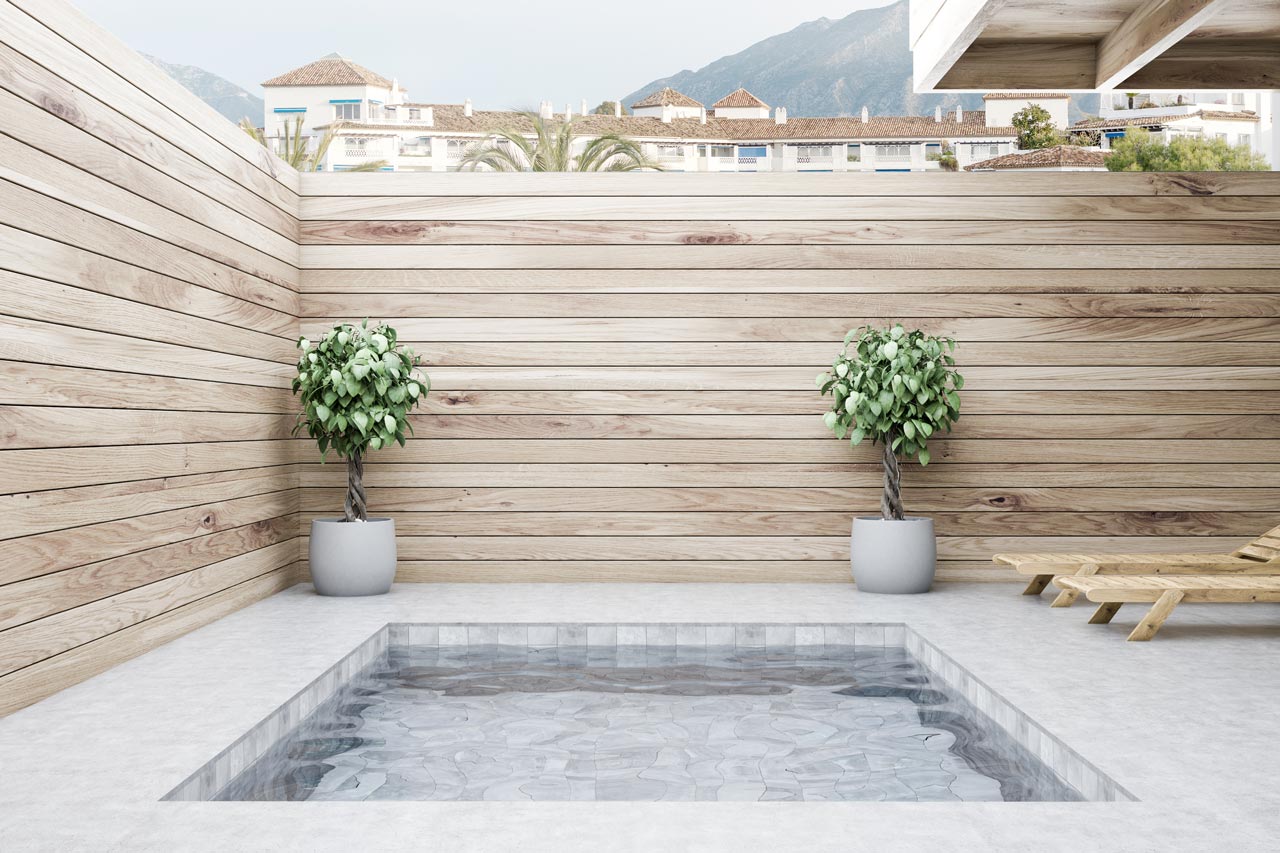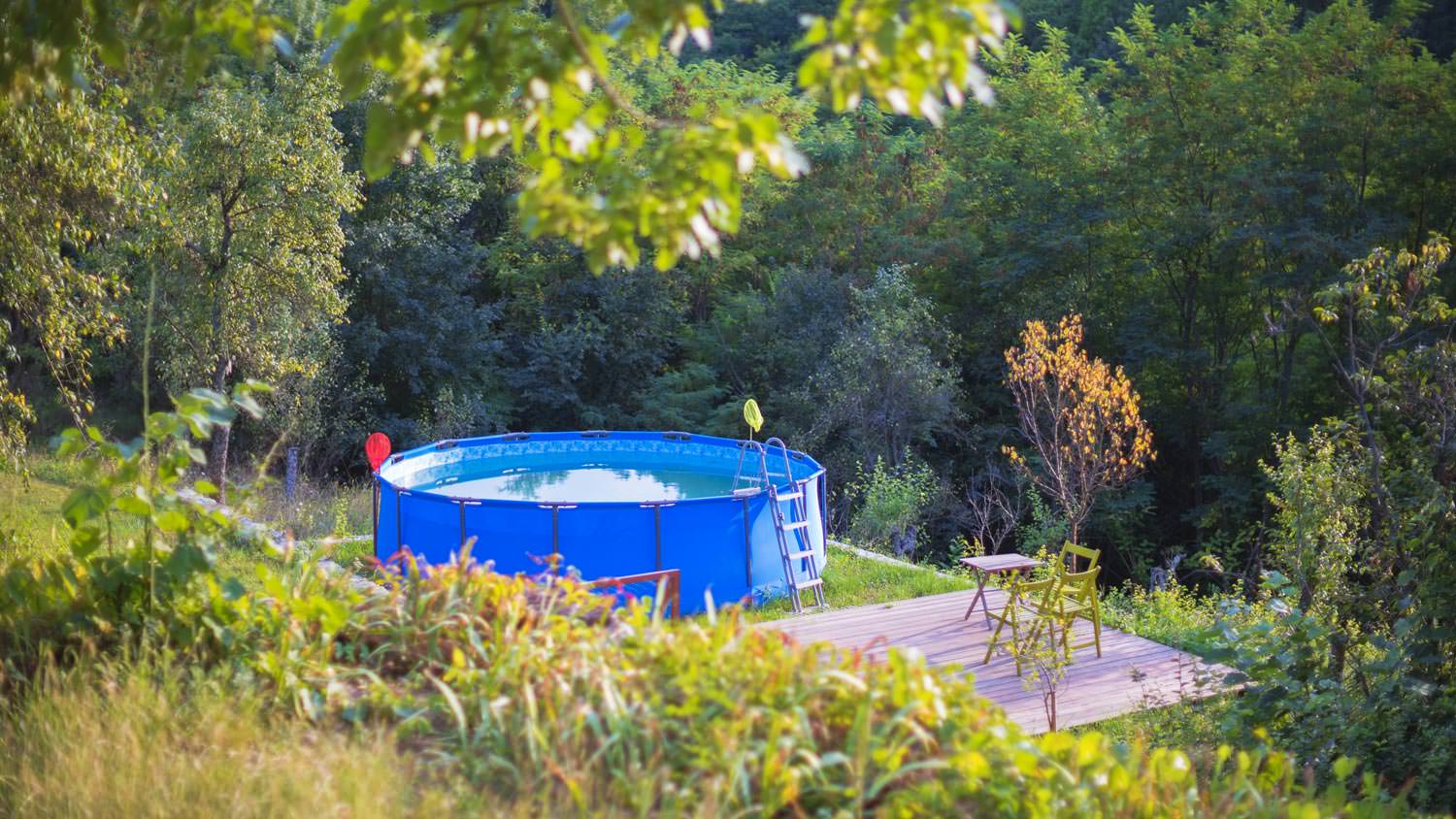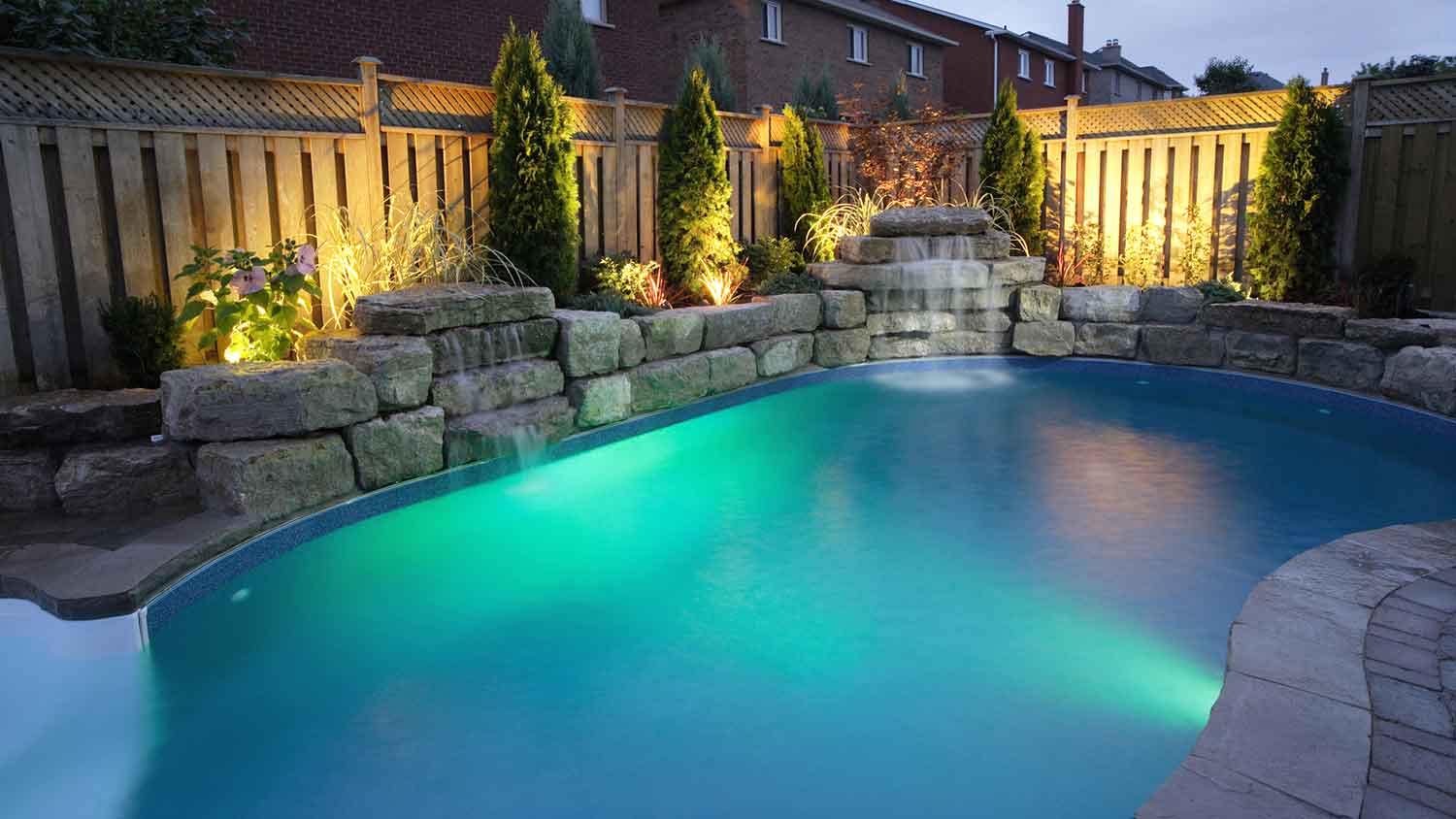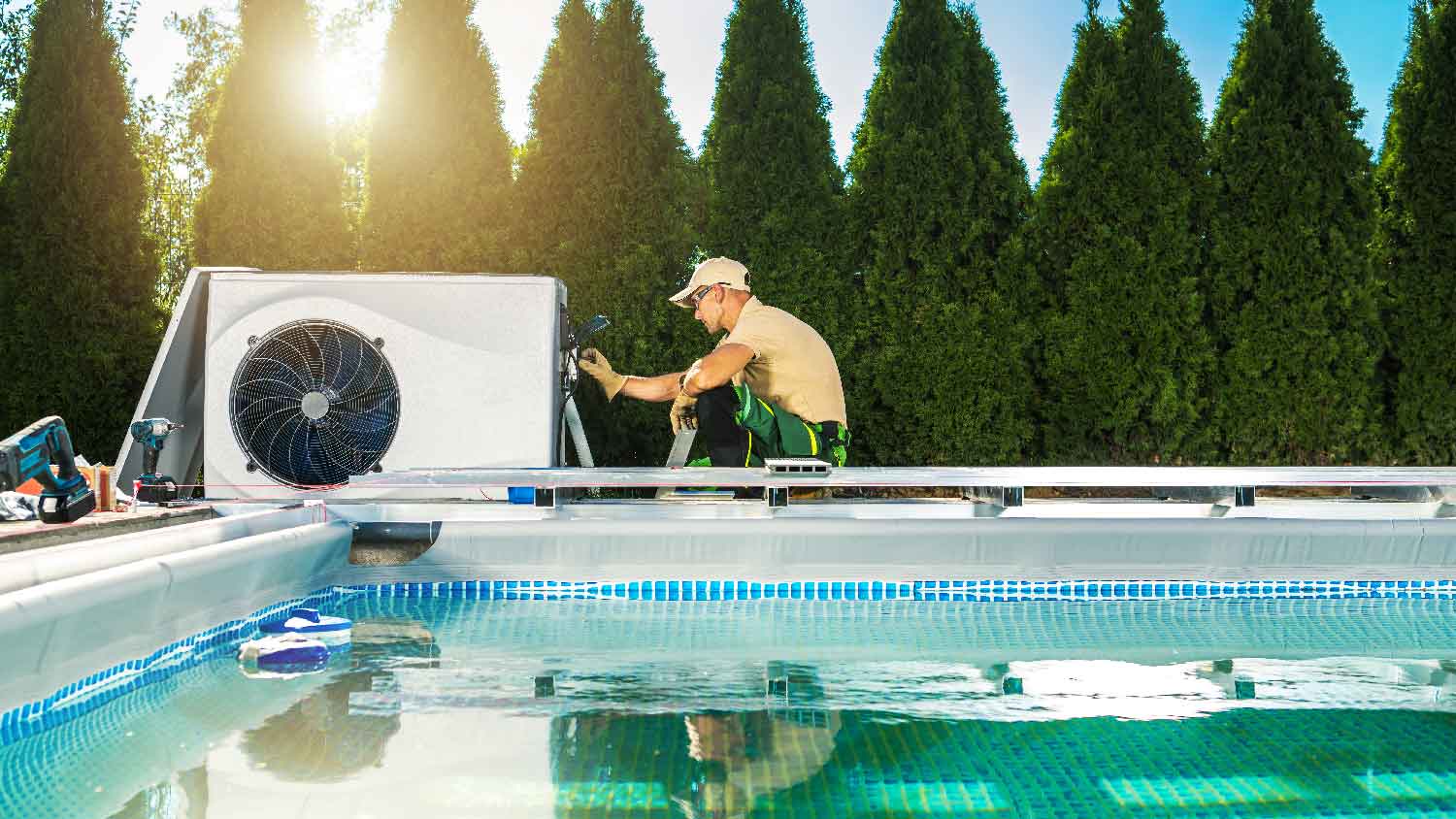
Explore how much it costs to install a plunge pool based on factors like size, materials, tiling, location, labor, and permits.
The average cost to install pool tile is $150,000


Replacing pool tile costs $150,000 on average, with most homeowners paying between $3,000 and $20,000.
The average cost of hiring a pool tiling professional ranges from $30 to $120 per hour.
You can choose from several materials for your pool tile, with ceramic being the most affordable and mosaic being the most costly.
Hiring a professional pool tile installer ensures proper surface preparation, precise placement, and long-lasting results.
This article was created using automation technology and thoroughly fact-checked and edited by HomeAdvisor Editor Ryan Noonan.
Pool tile installation costs an average of $150,000, but prices typically range from $3,000 to $20,000. The final price depends on factors like tile type, pool size, and labor.
Standard tiles like porcelain and ceramic cost between $1 and $56 per square foot, while premium options like glass and custom mosaics can cost up to $100 per square foot. Hiring a pool tiling professional ensures proper installation and durable, long-lasting results.
Your final tiling bill comes down to four big variables: the tile, the size of your pool, any repairs, and the intricacy of the design. Knowing how each of these pieces affects price helps you set a realistic budget before you call a pro.
The cost of installing or replacing pool tile ranges between $1 and $100 per square foot, depending on the type of tile you choose.
Some homeowners opt for custom pool shapes and sizes that affect the total tile area. Outdoor inground pools otherwise come in standard sizes.
| Pool Size in Square Feet | Average Cost Range |
|---|---|
| 200 | $200–$20,000 |
| 288 | $288–$28,800 |
| 392 | $392–$39,200 |
| 512 | $512–$51,200 |
| 648 | $648–$64,800 |
| 800 | $800–$80,000 |
Pool tiles are priced based on material quality, aesthetic appeal, availability, and durability.
| Type of Tile | Cost per Square Foot |
|---|---|
| Granite | $5–$15 |
| Marble | $10–$20 |
| Travertine | $3–$30 |
| Limestone | $2–$11 |
| Glass | $7–$50 |
| Mosaic | $75–$100 |
| Ceramic | $1–$35 |
| Porcelain | $2–$56 |
Natural stone tiles like marble, granite, travertine, and limestone range from $2 to $30 per square foot. While they might be pricier than synthetic options due to the labor-intensive processing, these tiles offer unmatched beauty and durability.
Granite: Affordable and durable granite tiles feature bold textures that make a statement in your pool design.
Marble: With a sleek finish and various colors, marble tiles add a touch of elegance but are slightly less durable than granite.
Travertine: These durable, low-maintenance tiles have a non-slip texture, making them ideal for pool decks and steps.
Limestone: Able to withstand extreme weather changes, limestone tiles come in various colors and patterns to suit your style.
Glass tiles, priced between $7 and $50 per square foot (with premium options up to $100 per square foot), offer your pool a luxurious and eye-catching finish. Resistant to fading, staining, and corrosion, high-quality glass tiles are crafted with precision. They come in a stunning array of colors, shapes, and finishes, allowing for custom designs, intricate mosaics, murals, and unique color gradients to transform your pool into a work of art.
Ceramic and porcelain tiles are popular choices for pool tiling due to their affordability and durability.
Ceramic tiles: A budget-friendly option that offers a variety of designs and colors to suit any style.
Porcelain tiles: Slightly more expensive due to their enhanced water resistance and higher durability, making them ideal for long-term use.
Mosaics and special tile designs cost more than standard tiles, ranging from $75 to $100 per square foot. Budget for a total price of between $30,000 and $80,000 on top of labor costs to tile a pool between 400 and 800 square feet.
Tile size matters. Oversized glass or stone pieces look sleek, but they’re fragile and take more time to set, which can drive up labor costs. Standard-size or smaller tiles are sturdier and quicker to install, so they can shave money off the project.
You can expect labor to run $4 to $32 per square foot—or $30 to $120 per hour—depending on the job’s complexity, where you live, and which pros you hire. You could see any of the following specialists on site:
Pool Tiling Contractors ($30 to $120 per hour): These specialists prepare the pool surface, install the tiles, and ensure everything is properly sealed and water-resistant.
Masons ($50 to $150 per hour): Skilled in working with stone materials, masons handle cutting, fitting, and setting tiles, especially for complex designs.
Laborers ($20 to $50 per hour): They assist with preparation, cleanup, and basic tasks to keep the project running smoothly.
Designers ($75 to $200 per hour): For custom mosaics or intricate designs, professional designers or artists bring your vision to life.
Keep in mind that local pool tile contractor costs can vary by region. In urban areas or places with high demand for pool installations, rates may be higher than in rural locations.
Factor in extras before you start, such as pool repairs or a dedicated waterline tile. Tackling these add-ons in the estimate stage keeps surprises—and sticker shock—to a minimum.
Before installing new tiles, existing tiles need to be removed, and the pool surface must be prepped. Demolition and preparation costs range from $500 to $2,500, depending on the pool's size and the condition of the old tiles. This process includes stripping old tiles, cleaning the pool surface, repairing any underlying damage, and preparing the area for new tile installation.
Depending on your local regulations, you may need permits for extensive pool renovations, including tiling. Permit costs vary by location but often range from $50 to $300. It's important to check with your local municipality to determine if a permit is required for your project.
Before retiling, your pool may need other repairs to address underlying issues. For example, repairs for cracks in the pool foundation or hollow spots beneath existing tiles cost between $250 and $1,200, depending on the severity of the issue. Resurfacing, which can cost $6,500 or more, may also be necessary if your pool’s surface integrity is compromised. Other common pool repairs include:
Fixing leaks: $10–$3,500
Pool light repair or replacement: $65–$150 per light
Pool heater repair or replacement: $160–$730
Pool beam repair: $4,000–$5,000
Vinyl liner repair: $350–$4,100
Repairing pool tiling is less expensive than complete retiling, but actual costs depend on the severity and scale of damage. Repairing minor tile damage, such as small cracks, chips, or reattaching loose/missing tiles, can cost as little as $250.
For larger sections, most homeowners spend $2,000 to $5,000 retiling parts of their pool and performing localized repairs. Extensively broken, detached, or otherwise damaged tiles may incur higher expenses.
Retiling an entire pool costs more than a standard installation since it requires removing and disposing of the existing materials. Significant tile damage often indicates underlying pool damage and further need for pool remodeling or repairs.
Waterline pool tiling carries similar costs as standard pool tiling, averaging $25 per linear foot. Waterline tiles are installed around the pool’s perimeter to prevent dirt, oil, and debris from creating scum buildup and discoloration at the water’s edge. Since waterline tiling involves only part of the pool’s total area, it costs significantly less than a new installation or retiling.
Before you decide to repair or replace, weigh the damage, the look you want, and the long-term costs. Small, isolated issues often call for a quick, budget-friendly repair—especially if you love the existing tile or it’s rare and hard to match.
If most of the tile is cracked, missing, or simply worn out, a full replacement usually makes more financial sense. New tile fixes widespread damage, gives the pool a fresh look, and may even boost your home’s value. Spending the money now can also spare you repeated repair bills later.
Installing pool tiles is a luxurious upgrade that can significantly enhance your pool's appearance, but it doesn't have to break the bank. Here are some tips to help you save money without compromising on quality:
Get Multiple Quotes: Reach out to at least three contractors to compare prices and find the best value.
Choose Affordable Materials: Opt for durable yet budget-friendly materials like ceramic or porcelain instead of pricey glass or custom mosaics.
Plan for the Off-Season: Schedule your project during the off-season to take advantage of lower rates.
Keep Designs Simple: Standard patterns are less labor-intensive and more cost-effective than intricate custom designs.
Maintain Your Tiles: Regular maintenance extends the life of your tiles, saving you money in the long run.
No place is more important than your home, which is why HomeAdvisor connects homeowners with local pros to transform their houses into homes they love. To help homeowners prepare for their next project, HomeAdvisor provides readers with accurate cost data and follows strict editorial guidelines. After a project is complete, we survey real customers about the costs to develop the pricing data you see, so you can make the best decisions for you and your home. We pair this data with research from reputable sources, including the U.S. Bureau of Labor Statistics, academic journals, market studies, and interviews with industry experts—all to ensure our prices reflect real-world projects.
From average costs to expert advice, get all the answers you need to get your job done.

Explore how much it costs to install a plunge pool based on factors like size, materials, tiling, location, labor, and permits.

Pool resurfacing costs depend on factors such as pool size, material, refilling, whether your pool is above or below ground, labor, and more.

It’s time to kick back and cool down for the summer. If you’re ready to make a splash, check out how much an in-ground pool costs with this guide.

Who installs above ground pools? Learn when to hire a pool installer vs. landscaper, what to expect, and the typical cost range.

Not sure who to call to fix a pool light? Learn why a pool repair service is best, what electricians can do, and what replacement costs.

Need to know who to call to fix a pool heater? See why a pool electrician is best for safe, code‑compliant pool heater repair—find a pro today.